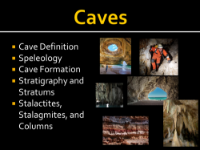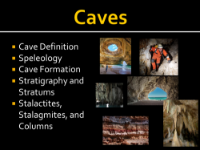15 Most Amazing Caves
Video
Science
+1
Science
10th Grade - 12th Grade
Premium

W
Weird Science
Science Resource Description
Go check out these 15 beautiful caves they are natural wonders one filled with huge crystals and one that the largest ice cave ever!
Subscribe for new videos Monday Wednesday and Friday!
9. The Reed Flute Cave – Guangxi, China
This cave is quite the landmark and a major tourist attraction that can be found on the outskirt of the city of Guilin in Guangxi, China. The cave gets its name from the reeds that grow inside it and are perfect for turning them into reeds. Not only that, but you can also find a variety of mineral formations, carbon deposits and stone pillars. The cave was rediscovered back in the 1940s by refugees and is around 180 years old with roughly 70 inscriptions on the walls that go as far back as 792 AD.
8. The Blue Grotto – Capri, Italy
This famous sea cave can be found right on the coast of the island of Capri in Italy where it extends for 177 feet. The sun’s light is able to pass through the underwater cavity and illuminates the ocean’s waters, producing a reflection that makes the cave glow blue. With only one entrance, this cave can only be reached by boat and the passengers must lie flat as the oarsman uses a metal chain to pull the boat into the cave. Visitors are also forbidden to swim in the grotto in order to preserve the clarity of the water.
7. The Lascaux Caves – Montignac, France
This cave is found in the southwestern region of France, where it is more known for the Paleolithic cave paintings that are found inside, which a teenager happened to stumble across them back in the 1940s. The cave art is dated at being around 17,300 years old and is made up of pictures of large animals that once existed during that time period. The caves were opened in 1948 and were made into a UNESCO World Heritage Site back in 1979.
6. The Cave of Crystals – Chihuahua, Mexico
This cave that can be found in Chihuahua, Mexico was just barely discovered back in 2000 when scientists found the chasm below after they had drilled an aquifer and managed to pump out thousands of gallons of water. The crystal formations mind numbingly huge as they are measured at being way over 30 feet with a diameter of 4 feet. This is because the water that they formed in was overflowing with calcium sulfate and the cave was being heated by magma. The cave is so hot that most people can only stay inside for around ten minutes with the proper protective gear.
5. The Glowworm Cave – Waitomo, New Zealand
This cave at Waitomo is located on the north island of New Zealand and as the name suggests it’s popularly known for the population of glowworms that have made this place their home. This cave happens to be a part of the Waitomo Cave system along with two other caves known as the Aranui and the Ruakuri Cave. The glowworm phenomenon is only unique to New Zealand which is why plenty of tourists pass through here each year.
4. The Eiskogelhöhle Cave
Depicted in the picture below is what’s known as the “Halle de Circe” or as it's translated to “Hall of Circle”. The ice pillars can be found in the Eiskogelhöhle in Salzburg, Austria. The cave was first discovered back in 1877 Eduard Richter. The site was proclaimed as a highly protected site after the passing of the Salzburg Nature Conservation Act.
3. The Eisriesenwelt Ice Caves – Werfen, Austria
Eisriesenwelt translates to “World of the Ice Giants,” which is fitting for this cave that is completely made out of natural limestone ice and can be found in Werfen, Austria. It is regarded as the largest ice cave on the planet and goes on for 26 miles. It’s estimated that the caves attract around 200,000 tourists annually that want to catch a glimpse at the ice formations. Whatever the season, these ice formations manage to stay frozen and cool year-round thanks to the area’s special weather conditions.
2. Fingal's Cave – Staffa, Scotland
This is a sea cave that lies on an uninhabited island in Scotland called Staffa. Its formation was brought forth by hexagonally jointed basalt columns inside of a Paleocene lava flow. The cave has established quite a name for itself because of its naturally arched ceiling that creates creepy noises with the help of the sea’s waves echoing.
1. The Cave of the Swallows – Aquismon, Mexico
This open air pit cave can be found at the Municipality of Aquismon in Mexico where it has a free fall drop that is measured at being 1082 feet from the floor of the cave to the lowest side of the opening and a This is classified as the second deepest pit in all of Mexico and the 11th in the whole world. The cave comes equipped with low temperatures and thick layers of vegetation near. You can also find a sinkhole that is estimated to go down an extra 1679 feet.
Unlimited access to 30,000+ resources
All subjects
National Curriculum Coverage
Award-winning content
Explore other content in this scheme
Part of a lesson by Teach with Fergy
Other resources in this lesson

Glow Worm Caves of New Zealand in 360° | National Geographic
Resource
Science
+1
10th Grade - 12th Grade

GCSE Science Revision - Formation of Sedimentary Rock layers
Resource
Science
+1
10th Grade - 12th Grade

Weird Places: Mexico's Giant Crystal Cave
Resource
Science
+1
10th Grade - 12th Grade

How Do Caves Form?
Resource
Science
+1
10th Grade - 12th Grade

Caves and Cave Formation - Student Presentation
Resource
Science
+1
10th Grade - 12th Grade

Caves and Cave Formation - Teaching Presentation
Resource
Science
+1
10th Grade - 12th Grade

Caves and Cave Formation - Exit Ticket
Resource
Science
+1
10th Grade - 12th Grade

Caves and Cave Formation - Student Lesson Outline
Resource
Science
+1
10th Grade - 12th Grade
This website uses cookies to enhance the user experience.
To get more information about these cookies check our

